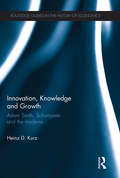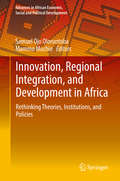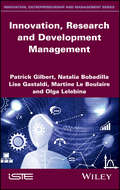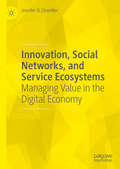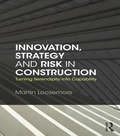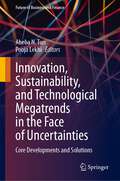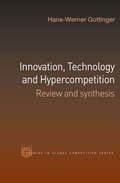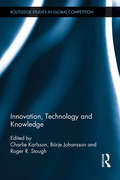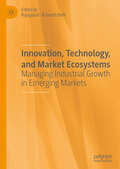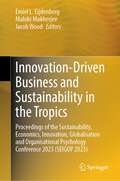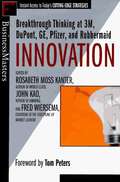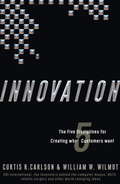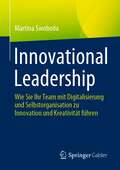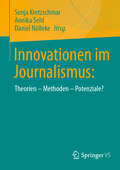- Table View
- List View
Innovation, Kanoon Aur Garibi: इनोवेशन, कानून और गरीबी
by Robert D. Cooter and Hans-Bernd Schaferकैसे कानून नवाचार (इनोवेशन), विकास, गरीबी पर असर डालते हैं और राष्ट्र गरीब व अमीर बनते हैं। कूटर व शेफर बताते हैं कि इनोवेटर की पूँजी की समस्याओं का हल भी बेहतर कानून कर सकते हैं, जिसे वे विश्वास की दोहरी समस्या कहते हैं तथा इसके समाधान सुझाते हैं। कानून व अर्थशास्त्र के संयुग्मित विचार विश्व की गहनतम समस्याओं के हल की समझ देते हैं। यह पुस्तक राष्ट्रों की गरीबी पर ही नहीं, वरन् उसके नागरिकों की विकास की आकांक्षाओं के लिए कानूनी व इनोवेटिव विचारों को ऊर्जा देती है। भारत में बेहतर कानूनी ढाँचागत व्यवस्था व नवाचार की ऊर्जा है। अतः यह पुस्तक भारतीय पाठकों के लिए उपयोगी सिद्ध होगी।
Innovation, Knowledge and Growth: Adam Smith, Schumpeter and the Moderns (Routledge Studies In The History Of Economics Ser. #104)
by Heinz D. KurzThis book deals with the prime movers of socio-economic development, innovations and technical change, their origins, forms and effects. It contains a set of closely related chapters, some of which have been previously published as papers in scholarly journals
Innovation, Knowledge and Power in Organizations (Routledge Studies in Global Competition)
by Theodora AsimakouThis book examines discourses of knowledge and innovation in post-industrial societies and knowledge-based organizations. The author investigates the value of knowledge and the question of innovation management in a fully commercial environment for a technology company. In contrast with most of the mainstream approaches to knowledge and innovation management this volume chooses as its starting point a critical examination of these assumptions before proceeding with further suggestions on how to manage knowledge. Using brand new empirical research, the author argues for the significance of addressing the political games and power struggles enacted in managing innovation processes, which result from the opportunity certain groups seek to acquire or extend their control over valuable resources. Again, in contrast to mainstream approaches that reduce power to the ability of individuals to negotiate in order to promote their ideas, the analysis adopts an extended view on power, and seeks to reveal the ambiguities and challenges of innovation management. This work will be of most interest to researchers and students of knowledge and innovation management, namely postgraduates and second degree students, as well as managers in knowledge-based organisations.
Innovation, Regional Development and the Life Sciences: Beyond clusters (Regions and Cities)
by Kean BirchThe life sciences is an industrial sector that covers the development of biological products and the use of biological processes in the production of goods, services and energy. This sector is frequently presented as a major opportunity for policy-makers to upgrade and renew regional economies, leading to social and economic development through support for high-tech innovation. Innovation, Regional Development and the Life Sciences analyses where innovation happens in the life sciences, why it happens in those places, and what this means for regional development policies and strategies. Focusing on the UK and Europe, its arguments are relevant to a variety of countries and regions pursuing high-tech innovation and development policies. The book’s theoretical approach incorporates diverse geographies (e.g. global, national and regional) and political-economic forces (e.g. discourses, governance and finance) in order to understand where innovation happens in the life sciences, where and how value circulates in the life sciences, and who captures the value produced in life sciences innovation. This book will be of interest to researchers, students and policy-makers dealing with regional/local economic development.
Innovation, Regional Integration, and Development in Africa: Rethinking Theories, Institutions, And Policies (Advances in African Economic, Social and Political Development)
by Samuel Ojo Oloruntoba Mammo MuchieThis edited volume discusses the role of innovation and regional integration in economic development in Africa. Over the past five decades, post-colonial African countries have struggled to break loose from the trap of poverty and underdevelopment through the adoption of various development strategies at regional, national, and continental levels. However, the results of both national and regional efforts at advancing development on the continent have been mixed. Although the importance of agglomeration and fusion of institutions have long been recognized as possible path to achieving economic development in Africa, the approach to regionalism has been unduly focused on market integration, while neglecting other dimensions such as social policy, mobility of labor, educational policy, biotechnology, regional legislation, manufacturing, innovation, and science and technology. This volume investigates the link between innovation, regional integration, and development in Africa, arguing that the immediate and long term development of Africa lies not just in the structural transformation of its economies but in the advancement of scientific and innovation capacities. The book is divided into four parts. Part I addresses the theoretical and conceptual underpinnings of innovation and regional integration in Africa. Part II presents case studies which examine how regional economic institutions are fostering innovation in Africa. Part III of the book deals with sectoral issues on innovation and integrated development in Africa. Part IV sets the future research on innovation, regional integration, and development in Africa. Combining theoretical analysis and a comparative, interdisciplinary approach, this volume is appropriate for researchers and students interested in economic development, political economy, African studies, international relations, agricultural science, and geography, as well as policymakers in regional economic communities and the African Union.
Innovation, Research and Development Management
by Patrick Gilbert Natalia Bobadilla Lise Gastaldi Martine Le Boulaire Olga LelebinaIn today’s business environment, as organizations constantly seek to growth and develop through the optimization of their innovative and creative potential, understanding the critical issues and management practices in R & D is essential. This book provides a critical revaluation of the state of the art issues and concepts in R&D management. The views expressed are those of leading French researchers and professionals in this field, fed by empirical studies in national and international firms.
Innovation, Social Networks, and Service Ecosystems: Managing Value in the Digital Economy
by Jennifer D. ChandlerThis book examines the ways in which value is created in the digital economy from a social networks and service ecosystems perspective. Focusing on innovation, this project explores analytics, Big Data, and privacy with respect to service management and value creation. It debunks these technology-centric buzzwords by relating cross-disciplinary research topics from seminal sociology, business, management, marketing, information systems, organizational, and technology theory under the common theme of plasticity, which is the ability of a system to take and retain form. A keen understanding of plasticity is the route to success in the digital economy. This book, aimed at academics, graduate students and practitioners in fields related to innovation, service research, and strategic management, offers a holistic perspective on innovation that is informed by scholarly research from multiple disciplines.
Innovation, Startups and Intellectual Property Management
by Ignacio De Leon Jose Fernandez DonosoThis book identifies the potential of intellectual property as a competitive asset for Latin American firms. The authors employ a cognitive approach that involves identifying why small firms are reluctant to register patents, resorting rather to alternative IP competitive strategies. This, in turn, results in the undercapitalization of intellectual assets, thus creating hurdles for the development of capital venture markets. Using new data gathered from highly innovative SMEs in Latin America and the Caribbean, the authors bring a fresh cognitive approach towards understanding the institutional role of intellectual property, and outline various new policy recommendations.
Innovation, Strategy and Risk in Construction: Turning Serendipity into Capability
by Martin LoosemoreInnovation, Strategy and Risk in Construction integrates insights from business and government leaders with contemporary research, to help built environment professionals turn serendipity to their own advantage by building greater innovative and adaptive capacity into their operations. Accessible and full of practical examples, the book argues that traditional business strategies which seek to systematise innovation and eliminate uncertainty need to be balanced with more flexible approaches which acknowledge and harness uncertainty. The missing key to innovation, it is argued, is to turn serendipity into capability. The author proposes a simple model which allows managers to tap into the increasingly dynamic and interconnected nature of the construction industry. Innovation does not occur in isolation within individual firms, but through collaboration. Each stakeholder in the construction industry has a responsibility to drive innovation, and this book will be key reading for consultants, contractors, subcontractors, suppliers and clients, as well as policy makers and all serious students of construction management.
Innovation, Sustainability and Management in Motorsports: The Case of Formula E
by Hans Erik Næss Anne Tjønndal“There’s probably no better sport than Formula E to present and study the science and practice of innovation within (motor)sport, and this book is a must read for those active within this fascinating area”.- Dr. Kristof de Mey, Sports Technology, Innovation & Business Developer at Ghent University, BelgiumThis open access book provides novel insights on management innovation and sustainability in motorsport. Utilizing the all-electric racing championship called Formula E as case, it draws upon data from multiple sources such as sustainability reports of Formula and its stakeholders, media data, podcasts and newspaper articles, partner publications, and social media outputs. It aims to generate a theoretical model that describes and explains the optimal conditions for innovation when it comes to enhancing a sport organisation's commercial product. Apart from its general transferability to sports research, this model enables further study of a motorsport phenomenon that has been hailed by media as the championship, which affirms money in sustainability. It has also been emphasized by sport researchers as a highly relevant case to study management innovation.This book will be interesting to academics working in sports management, knowledge management, innovation and sustainability.Hans Erik Næss (b. 1978) is an Associate Professor in Sport Management at Kristiania University College, Norway. He holds a PhD in sociology from the University of Oslo and is the author of several peer-reviewed articles and books on motorsports, including A History of Organizational Change: The case of Fédération Internationale de l’Automobile (FIA) 1945-2020.Anne Tjønndal (b. 1988) is an Associate Professor in Sociology of Sport at Nord University, Norway. She holds a PhD in sociology from Nord University and has published articles in high-quality international journals on topics like social innovation, gender and inclusion/exclusion in sport. Tjønndal is the Celia Brackenridge International Research Award winner for 2019.
Innovation, Sustainability, and Technological Megatrends in the Face of Uncertainties: Core Developments and Solutions (Future of Business and Finance)
by Abeba N. Turi Pooja LekhiThis edited book focuses on the multidimensional aspects of the technological megatrends shaping our global economic system's social, economic, and geopolitical order in the face of uncertainties. With continued shocks, economic downturns, socio-political crises, climate change, and waves of pandemics that pose an existential threat, technological forces have significant effects in defining our path. In this book, by focusing on recent innovations and technological megatrends, the authors assess the sustainability of such human developments in the face of uncertainty. The book analyses the core developments, and trending tech solutions that pause challenges and bring opportunities for businesses and the economies as our global economy emerges from the devastating economic downturn caused by the COVID-19 pandemic and beyond. The book appeals to professionals wanting to assess how technological developments and innovation will impact their areas, but also to researchers interested in the impact on businesses, industries and economies.
Innovation, Technology and Hypercompetition: Review and Synthesis (Routledge Studies in Global Competition)
by Hans-Werner GottingerIn an increasingly technologically-led century the striking pattern emerging in firms’ innovative activities is their competition for a technological leadership position in situations best described as races. A 'race' is an interactive pattern characterized by firms constantly trying to get ahead of their rivals, or trying not to fall too far behind. In high technology industries, where customers are willing to pay a premium for advanced technology, leadership translates into increasing returns in the market through positive network externalities. Innovation, Technology and Hypercompetition synthesizes and unifies the various methodological approaches for the industry-specific analysis of fast changing competitive positions driven by relentless innovation (hypercompetition). Game-theoretic and agent-based tools are applied to competitive industries in various market settings and in a global context. Rivalry of this sort is seen to extend to the catching up and forging ahead of regions and nations. In this revealing volume, Hans-Werner Gottinger brings his expert eye to this issue and employs various tools from economic theory to attain this end. He provides the behavioural foundations for what is driving globalization, in this, a volume of interest to academic economists, legal experts, management consultants and practitioners alike.
Innovation, Technology and Knowledge: Knowledge, Technology And Internationalization (Routledge Studies In Global Competition Ser. #55)
by Charlie Karlsson Roger R. Stough Börje JohanssonIn the last four decades the developed economies have developed into veritable knowledge economies at the same time as more and more economies have entered the road to economic development. Typical for the developments during this time has been substantially increased investments in research and development (R&D) to generate new knowledge and new technologies and increased investments in diffusing existing knowledge by means of education and thereby raising the volume of human capital. However, many member states and regions within the EU are struggling with their economic development. This book explores the uneven patterns of development within the EU, discusses the relative effect of investments on innovation and productivity growth and looks at the mechanisms involved in economic development and policy.
Innovation, Technology, and Market Ecosystems: Managing Industrial Growth in Emerging Markets
by Rajagopal Ramesh BehlThis edited book brings together international insights for raising rich discussion on industrial growth in the twenty-first century with a focus on the Industry 4.0 drive in the global marketplace, which is driven by innovations, technology, and digital drives. It delineates multiple impacts on business-to-business, business-to-consumers, the global-local business imperatives, and on the national economy. The chapters critically analyze the convergence of technology, business practices, public policies, political ideologies, and consumer values for improving business performance in the context of Industry 4.0 developments. This contribution will enrich knowledge on contemporary business strategies towards automation and digitization process in manufacturing, services, and marketing organizations. The discussions across the chapters contemplate developing new visions and business perspectives to match with the changing priorities of industries in the emerging markets.
Innovation, between Science and Science Fiction
by Thomas MichaudFantasy and science fiction are both involved in the process of innovation in techno-scientific societies. Long regarded as a hindrance to rationality, and to science, science fiction has become the object of praise in recent decades. Innovative organizations use science fiction to stimulate the creativity of their teams, and more and more entrepreneurs are using its influence to develop innovation. Scientific practice relies in part on an imaginary dimension. The mapping of the technical imagination of science fiction has become an important strategic issue, as has its patentability. The conquest of space, the construction of cyberspace and virtual reality, biotechnologies and nanotechnologies are all at the center of futuristic fictions that participate in scientific speeches and discoveries.
Innovation-Driven Business and Sustainability in the Tropics: Proceedings of the Sustainability, Economics, Innovation, Globalisation and Organisational Psychology Conference 2023 (SEIGOP 2023)
by Emiel L. Eijdenberg Malobi Mukherjee Jacob WoodThe edited volume presents the conference proceedings from the “Sustainability, Economics, Innovation, Globalisation and Operational Psychology Conference 2023” (SEIGOP 2023), organized by the Centre for International Trade and Business in Asia (CITBA) at James Cook University, Singapore. This edited volume places the highly dynamic, but also, jeopardized climatological – geographical region of the Tropics centre stage. The region is developing rapidly, with significant progress being made through the development of innovative technologies. The Tropics represent a region in which people live amid the greatest level of biodiversity anywhere on the planet. Nonetheless, propelled by rapid population growth, the Tropics is a region on the rise, with higher living standards and increased levels of international trade and investment. Densely populated emerging countries like India, Indonesia and Nigeria will be among the largest economies of the world by the end of the century. These upward socioeconomic trends are compromised by the impact of climate change on the Tropics’ biodiversity. Such developments have forced policymakers, businesses, and local communities to search for more sustainable and creative ways to live and work. For these reasons, this edited volume presents theory-driven conceptual, qualitative, quantitative and mixed-methods studies on the impact of innovation-driven businesses on the complex interplay of socio-cultural, economic, and environmental factors in the Tropics.
Innovation: A Customer-Driven Approach
by Marco Iansiti Thomas J. Kosnik Ellen SteinProvides a selection of methodologies for the investigation of user needs, concept development, and product design.
Innovation: Breakthrough Thinking at 3M, DuPont, GE, Pfizer, and Rubbermaid
by John Kao Rosabeth Moss Kanter Fred WiersemaHow breakthrough thinking helps the business world
Innovation: The Five Disciplines for Creating What Customers Want
by William W. Wilmot Curtis R. CarlsonNothing is more important to business success than innovation ... And here's what you can do about it on Monday morning with the definitive how-to book from the world's leading authority on innovation. When it comes to innovation, Curt Carlson and Bill Wilmot of SRI International know what they are talking about--literally. SRI has pioneered innovations that day in and day out are part of the fabric of your life, such as: *The computer mouse and the personal computer interface you use at home and work *The high-definition television in your living room *The unusual numbers at the bottom of your checks that enable your bank to maintain your account balance correctly *The speech-recognition system used by your financial services firm when you call for your account balance or to make a transaction. Each of these innovations--and literally hundreds of others--created new value for customers. And that's the central message of this book. Innovation is not about inventing clever gadgets or just "creativity." It is the successful creation and delivery of a new or improved product or service that provides value for your customer and sustained profit for your organization. The first black-and-white television, for example, was just an interesting, cool invention until David Sarnoff created an innovation--a network--that delivered programming to an audience. The genius of this book is that it provides the "how" of innovation. It makes innovation practical by getting two groups who are often disconnected--the managers who make decisions and the people on the front lines who create the innovations--onto the same page. Instead of smart people grousing about the executive suite not recognizing a good idea if they tripped over it and the folks on the top floor wondering whether the people doing the complaining have an understanding of market realities, Carlson and Wilmot's five disciplines of innovation focus attention where it should be: on the creation of valuable new products and services that meet customer needs. Innovation is not just for the "lone genius in the garage" but for you and everyone in your enterprise. Carlson and Wilmot provide a systematic way to make innovation practical, one intimately tied to the way things get done in your business. Teamwork isn't enough; Creativity isn't enough; A new product idea isn't enough; True innovation is about delivering value to customers. Innovation reveals the value-creating processes used by SRI International, the organization behind the computer mouse, robotic surgery, and the domain names .com, .org, and .gov. Curt Carlson and Bill Wilmot show you how to use these practical, tested processes to create great customer value for your organization.
Innovational Leadership: Wie Sie Ihr Team mit Digitalisierung und Selbstorganisation zu Innovation und Kreativität führen
by Martina SwobodaUm ein Unternehmen widerstandsfähig aufzustellen und innovativ zu arbeiten, brauchen Führungskräfte passionierte und motivierte Mitarbeiter. Die Autorin stellt in diesem Buch das nachhaltige Konzept Innovational Leadership vor, welches einen Weg hin zu einer Führungskultur zeigt, die Innovationen und Kreativität fördert und in das Alltagsgeschäft integriert. Innovational Leadership inspiriert Menschen, kreativ zu arbeiten, Innovation zu schaffen und Sinn und Freude an ihrer Arbeit zu erleben. Digitalisierung, hybride Führung und selbstorganisierte Teams bilden dafür das Fundament.Aus der Praxis für die Praxis: Innovational Leadership wurde von der Autorin selbst entwickelt und erfolgreich in einem Konzern eingesetzt. Es erwarten Sie zahlreiche Praxisbeispiele, konkrete Tipps für die Umsetzung und Anregungen für die ersten Schritte. Da Innovation von Inspiration lebt, finden Sie zudem Interviews mit Experten und anderen Praktikern zu Themen wie hybride Führung, agile Organisationen, soziale Innovationen etc.Der InhaltDie Methode Innovational LeadershipDie Zukunft digital gestalten – von Ängsten und MöglichkeitenMit Selbstorganisation das Basisgeschäft sichernVon innovativen ArbeitsweltenDie selbst innovierende Organisation
Innovationen im Gesundheitswesen: Rechtliche und ökonomische Rahmenbedingungen und Potentiale
by Philipp Plugmann Roman Grinblat Daniela EttererInitiatoren von Innovationen im Gesundheitswesen müssen eine ganze Reihe von zum Teil vielschichtigen Herausforderungen meistern – hier gilt es, rechtliche, regulative wie ökonomische Rahmenbedingungen im Blick zu behalten und dennoch alle Potentiale zu heben. Dieses Fachbuch gibt aus verschiedenen Perspektiven einen breiten Überblick darüber, wie Recht und Ökonomie das Gesundheitswesen beeinflussen, prägen und verändern. Dabei werden auch interdisziplinäre Einflüsse von Schlüsseltechnologien wie Künstlicher Intelligenz eingebunden sowie Themen des Datenschutzes und Haftungsfragen analysiert und bearbeitet, die gegenwärtig und zukünftig bei Fragestellungen zu Innovationen bei Medizinprodukten, Medikamenten und Apps eine Rolle spielen. Insofern wagt das Buch über den Status quo hinaus eine Prognose in die weitere Entwicklung des deutschen Gesundheitswesens. Dabei behält es stets auch den Praxisbezug im Blick und verweist auf verschiedene Best-Practice-Beispiele.
Innovationen im Handel
by Wolfgang LuxIn dem Buch legt der Autor dar, wie sich der Handel durch neue Entwicklungen wie Nachhaltigkeit, demographischer Wandel, mobiles Internet, soziale Netze u. ä. verändern wird. Ist der Handel in Deutschland dafür gewappnet? Praxisnah und allgemeinverständlich geschrieben, zeigt das erste Buch zum Innovationsstau im deutschen Handel, welche Voraussetzungen zu schaffen sind. Der Band basiert u. a. auf Interviews mit Vorständen und Geschäftsführern der deutschen Handels- und IT-Branche, die ein klares Bild der Branche und ihrer Zukunft zeichnen.
Innovationen im Journalismus: Theorien – Methoden – Potenziale?
by Annika Sehl Sonja Kretzschmar Daniel NöllekeDer Wandel von Journalismus und Medien ist eine Konstante im digitalen Zeitalter. Dieser Wandel betrifft die Mikro- und Meso- ebenso wie die Makroebene. Neue Akteure sind hinzugekommen, tradierte Geschäftsmodelle von Medienunternehmen ins Wanken geraten und die Plattformisierung wirft neue Fragen nach Gemeinwohl auf. Wie können Medienorganisationen die Herausforderungen meistern und einen qualitativ hochwertigen Journalismus sicherstellen? Was kann die Journalismusforschung leisten? Dieser Sammelband verfolgt das Ziel, das breite Spektrum von Innovationen in Journalismus und Medien wissenschaftlich einzuordnen und zu strukturieren. Dabei werden sowohl theoretische Annäherungen, als auch praxisnahe Umsetzungsformen diskutiert. Der Sammelband geht auf eine Tagung der DGPuK-Fachgruppe Journalistik/Journalismusforschug zum selbigen Thema zurück.
Innovationen im Personalmanagement: Die spannendsten Entwicklungen aus der HR-Szene und ihr Nutzen für Unternehmen
by Nele GrafDieses Werk stellt erstmals herausragende und ungewöhnliche Innovationen im Personalmanagement vor. Verantwortliche im Bereich Human Resources müssen immer kreativer werden, um die an sie gestellten Anforderungen zu erfüllen und sich als strategischer Partner zu positionieren. Daher ist es notwendig, über neue Entwicklungen im Recruiting, der Personalentwicklung und dem HR-Management allgemein auf dem Laufenden zu bleiben und Relevantes umzusetzen. Personalverantwortliche, Geschäftsführer, Berater, Studenten und Start-Ups erfahren, was sich im Personalmanagement tut und wie sie die neuen Entwicklungen für sich nutzen können.
Innovationen in der Gesundheitsversorgung: Neue Ansätze und Impulse für Prävention, Gesundheitsförderung und Homecare
by Philipp Plugmann Julia PlugmannWährend Digitalisierung, Innovationen, Forschung und Entwicklung im Bereich Medizintechnik und -produkte und Life Science die Diagnose- und Therapieverfahren verbessern und viele Fortschritte ermöglichen, werden andererseits durch den demografischen Wandel, den zunehmenden Fachkräftemangel, den Druck auf den deutschen Mittelstand und den immer stärker werdenden internationalen Wettbewerb, gesundheitsökonomische Grenzen für die Bezahlbarkeit unserer Gesundheit gesetzt, die Auswirkungen auf Quantität und Qualität der deutschen und europäischen Gesundheitsversorgung haben werden.Deshalb ist es besonders wichtig, rechtzeitig die Innovationspotenziale dieser Branche auszuloten und zu heben. Die Beiträge in diesem Buch zu Themen wie Cybersicherheit, betriebliches Gesundheitsmanagement, personalisierte Prävention, Psychologie, Technologie und Home Care liefern neue Ansätze und Impulse und leiten konkrete Handlungsempfehlungen für etablierte Unternehmen und Start-Ups in der Gesundheitswirtschaft ab.

